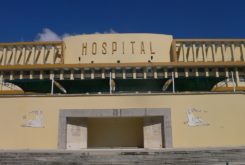The impact of the Covid-19 pandemic will “weigh heavily” on Mozambique´s economy, with real GDP contracting by 4.4% in 2020, before recovering slowly to a growth of 1% in 2021, according to the Economist Intelligence Unit (EIU).
On August 5th, Mozambican president, Filipe Nyusi, declared a new state of emergency for a period of 30 days, running from August 8th to September 6th, in order to contain the spread of the Covid-19 pandemic, with a further easing of restrictions, in three phases.
In phase one, beginning on August 18th, higher education institutions and religious gatherings with a maximum of 50 people will be reopened, followed in phase two (September), by cinemas, casinos and gyms and in phase three, (October 30th), by Grade 12 school classes.
The president first imposed a state of emergency on April 1st and extended it three times (the maximum allowed under the constitution), seeking throughout this period to “ease restrictions, despite rising infection rates, as it seeks to limit the economic fallout from the pandemic”, according to EIU´s new report on Mozambique.
In EIU´s view, the government’s strategy has been “largely ineffective in slowing the spread of the virus, while crackdowns on rule-breaking inflame social tensions”.
“With a further watering-down of restrictions in the latest state of emergency (and a timetable for the further reopening of sectors), we believe that the government is seeking to reduce its own responsibility for containing the virus (shifting the responsibility onto individuals) while it prioritises restoring economic activity”, the EIU says.
Further lockdown-style measures, it adds, “would probably have serious economic consequences (exacerbating the decline in real GDP that we forecast for this year), and the government has decided that such measures would be too high a price to pay”.
Despite the ongoing easing of restrictions, the EIU forecasts a 4.4% drop in real GDP this year, with a heightened risk of protests.
This is despite investments in the nascent gas industry, which the EIU expects will boost Real GDP growth to an average 6.8% a year in 2022-24.
Although Mozambique was cut off from capital markets in 2016, following the revelation of illegally contracted secret debt, partners have still been willing to finance the gas industry.
The country´s fiscal deficit is expected by EIU to widen in 2020, as revenue plummets, and to contract in 2021 as government spending dips.
The current-account deficit will widen to 28.8% of GDP in 2020 as exports decline, and to 31.3% of GDP in 2023 as capital goods imports for the gas industry rise, according to the EIU.
Inflation is expected to reach 3.6% in 2020, reflecting reduced consumer demand during the lockdown period, which will “help to constrain the rate of increase and the impact of ongoing currency depreciation”, the report adds.




